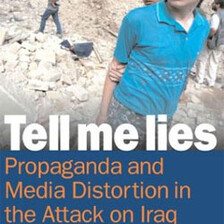The Independent 13 January 2003
Pilger cleared of bias in TV documentary on Palestinians
By Louise Jury
13 January 2003
Television regulators have cleared John Pilger of breaking broadcasting rules in his documentary on the Middle East which attracted more than 100 complaints from viewers.
Palestine is still the issue: A special report by John Pilger, shown in September, incurred the wrath of Michael Green, the Jewish chairman of Carlton television which made the programme, and provoked 116 complaints about bias and inaccuracy to the Independent Television Commission (ITC). The ITC also received 553 letters supporting the documentary.
In an adjudication published today the ITC says that, despite orchestrated campaigning for and against the programme, Carlton had provided “persuasive evidence of the care and thoroughness with which it was researched.”
The programme, which was watched by about one million viewers, saw the journalist revisiting a subject on which he had made a film under the same title in 1974. It aimed to explain the Palestinian conflict, starting from the view that few people understood the roots of the conflict despite widespread news coverage.
He examined issues that he claimed the media rarely tried to get to grips with, such as what exactly drove a Palestinian suicide bomber to commit what he acknowledged were acts of terrorism.
He condemned Israeli injustices towards Palestinians and blamed the conflict primarily on the 35-year occupation of the West Bank and Gaza Strip by Israel, despite UN resolutions calling for withdrawal.
The Board of Deputies of British Jews and Conservative Friends of Israel immediately registered their anger at what they saw as a one-sided argument. A decision by ITV to broadcast on Yom Kippur, the holiest day in the Jewish calendar, caused added offence.
Mr Green told the Jewish Chronicle newspaper: “It was one-sided, it was totally unrealistic … it was factually incorrect, historically incorrect.”
But the ITC ruled that in numerous cases where critics had alleged inaccuracy, Carlton was able to produce a range of historical texts to defend Mr Pilger’s argument.
The ITC noted that Israeli spokesmen were allowed to put a pro-Israeli perspective. Although they did not receive the same amount of time, they were given an “adequate opportunity” to respond.
A spokesman for Carlton said they were pleased the ITC had praised the programme for its thoroughness.
14 January 2003 12:44
Search this site:
Go
Printable Story
© 2002 Independent Digital (UK) Ltd
